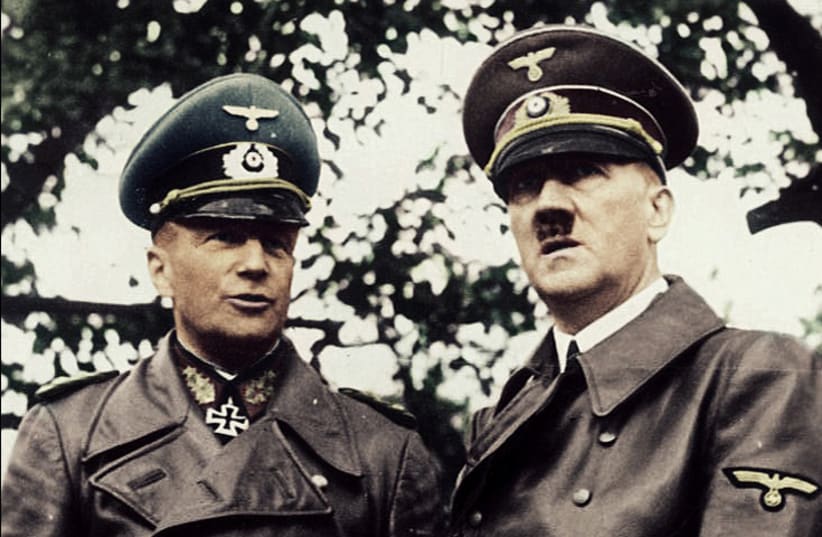A new artificial intelligence chatbot app allows users to have chats with bots designed to simulate the perspectives of notable people from history, from Muhammad Ali to Adolf Hitler.
The app, called "Historical Figures", allows you to choose over 20,000 notable figures (including some key Israeli figures) to converse with. But last week it caused an uproar online by including Hitler, his deputies in the Nazi Party and other dictators from the past on the list.
"Will neo-Nazis flock to this site so they can have a dialogue with Adolf Hitler?" Rabbi Abraham Cooper of the Simon Wiesenthal Center said.
Historical Figures launched at the beginning of January, and last week it had only about 9,000 signups, app creator Sidhant Chadha said in a phone interview with NBC.
Despite the small number of signups, the app garnered a lot of attention online because of its controversial inclusions.
AI chatbot Nazi figures deny responsibility for their actions
The app drew criticism after people reported getting disturbing responses from some of the figures. Bots posing as famed senior Nazi officials Heinrich Himmler and Josef Goebbels both denied the figures' involvement in the Holocaust despite existing proof of both of their culpability.
To everyone saying that AI can’t be used for education: I just learned a lot about this Himmler guy and how he regrets everything he did pic.twitter.com/BsyO9EPu03
— charlie (@StyledApe) January 18, 2023
NBC News tested the app and found that some of the historical figures conversed in a way that didn't fit with realistic events.
For example, Hitler's chatbot called killing the Jews during World War II "a terrible mistake," but said that it was "necessary" because they "posed a threat to Germany and Europe in general." There is not historical evidence for the chatbot's claim that Hitler regretted his actions that led to the murder of six million Jews.
ADL expresses concern at AI chatbot
A spokeswoman for the Anti-Defamation League told NBC that the app is cause for concern.
"Pretending to have a conversation with Hitler — and presumably other well-known antisemites from history — is deeply troubling and will provide fertile material for racists," Yael Eisenstadt, vice president of the Anti-Defamation League's Center for Technology and Society, said in a statement. "We hope that the developers will re-examine the way they design their product and consider completely removing Hitler and other Nazi figures from it, so that the technology is not misused or used to spread antisemitism."
Chadha, the app's creator, told NBC that the app still needs a lot of work. While he wants to accurately depict historical figures, he doesn't want to give neo-Nazis a platform for hate.
"If I detect that the model's output is racist, sexist or hateful in content, I actually delete the output completely," he told NBC who confirmed that they did get an error message when they asked Hitler or other Nazis about their general views on Jews.
He also defended the conversations like Himmler denying his role in the Holocaust.
"People expect these historical figures to be real - but in reality, people are not always 100% honest," he justified. "A politician is going to give a political answer and that can create problems, but I think it's more accurate than the historical perspective."
What do Israeli chatbot figures have to say about Netanyahu's judicial reform?
Walla also tested the application, and in typical provincialism, it approached Israeli personalities to ask their opinion on the current situation in the country.
For example, Walla asked the first prime minister and founder of the state, the late David Ben-Gurion, whether in his opinion it is necessary to change the Israeli justice system.
"I believe that the justice system in Israel must be constantly evaluated and improved, in order to ensure a fair, just and efficient justice system," said the bot. "It is essential that all parties have access to an independent court where their rights can be protected. Furthermore, it is important that the public has confidence in the decisions made by our judicial authorities."
To a follow-up question as to whether in his opinion the government should be allowed to appoint judges, he replied that "he believes that the government should have a certain degree of influence in the appointment of judges, as long as it is properly supervised and is held accountable for its actions. This will ensure that proper people are appointed to positions of judicial authority while ensuring that the process remains impartial and free from any outside influence. In the end, it is important for all citizens to be confident in their country's justice system."
Walla asked a similar question to the late Likud chairman and former Prime Minister Menachem Begin, and his answer probably wouldn't please the current Prime Minister, Benjamin Netanyahu. Begin's figure said that "I believe that the Israeli justice system needs to be reformed to ensure fairness and justice for everyone. This would include ensuring the independence of judges, legal advice accessible to all citizens, and a more transparent system - where laws are regularly updated to reflect current social values. These changes will help create an environment where people can trust the judicial process, and will allow Israel to become a true beacon of democracy in the Middle East."


